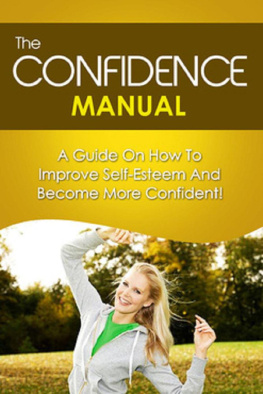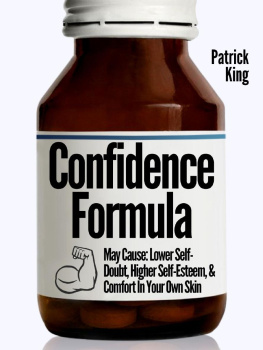HUDSON STREET PRESS
Published by the Penguin Group
Penguin Group (USA), 375 Hudson Street,
New York, New York 10014, USA

USA | Canada | UK | Ireland | Australia | New Zealand | India | South Africa | China
Penguin Books Ltd, Registered Offices: 80 Strand, London WC2R 0RL, England
For more information about the Penguin Group visit penguin.com
First published by Hudson Street Press, a member of Penguin Group (USA), 2013
 REGISTERED TRADEMARKMARCA REGISTRADA
REGISTERED TRADEMARKMARCA REGISTRADA
Copyright Tomas Chamorro-Premuzic, 2013
All rights reserved. No part of this product may be reproduced, scanned, or distributed in any printed or electronic form without permission. Please do not participate in or encourage piracy of copyrighted materials in violation of the authors rights. Purchase only authorized editions.
LIBRARY OF CONGRESS CATALOGING-IN-PUBLICATION DATA
Chamorro-Premuzic, Tomas.
Confidence : overcoming low self-esteem, insecurity, and self-doubt / Tomas Chamorro-Premuzic, PhD.
pages cm
Includes bibliographical references and index.
ISBN 978-0-698-13712-7 (eBook)
1. Self-confidence. 2. Self-esteem. I. Title.
BF575.S39C43 2013
158.1dc23 2013020202
to Zdenka Premuzic
(who does not need to read this book)
Contents
Dear Reader:
If you picked up this book to increase your confidence, you are not alone. Millions of people have low confidence and most of them worry about it, not least because it is hard to boost our confidence at will. The good news is that low confidence is less problematic than you think. In fact, although society places a great deal of importance on being confident, there are no genuine benefits except feeling good. In fact, lower confidence is key to gaining competence, which is the only effective strategy for gaining genuine confidenceconfidence that is warranted by ones actual competence.
Confidence is feeling able and competence is being able, but how are the two related? Too many people ignore this question and simply assume that higher confidence is advantageous per se. Although this assumption is unfounded, it has nonetheless encouraged a mindless and often self-destructive quest for higher confidence. Indeed, in much of the Western world, particularly the United States, the assumption is that more confidence is always better. If it werent for this assumption, you might not even be reading this book. There is no reason to be ashamed of our low confidence.
The main difference between people who lack confidence and those who dont is that the former are unable (or unwilling) to distort reality in their favor. Thats right, the successful distortion of reality is the chief underlying reason so many people dont experience low confidence when they should. Whereas pessimism leads to realism, optimism promotes the fabrication of alternative realitieslying, not to others, but to ourselves. There is no reason to envy people who appear confident, even if they are also successful; their success is usually the cause rather than consequence of their high confidence. The idea that we must do something about our low confidence is by and large the result of popular myths, which are not hard to debunk.
If you are concerned about your low confidence, this book will teach you what you can do about it. The main lesson is that you should aspire not to have high confidence, but to have high competence, and I will show you how to make that happen. Confidence will follow more easily when you can back it up with real accomplishments (and even then, it may be better to remain relatively unassertive).
Approach this book with as critical and open a mind as you can. Do not assume that the power to become instantly more confident is simply in your hands or that high confidence should be your goal. Moreover, dont assume that having low confidence will harm your chances of doing well in life. Or if you prefer to make these assumptions, be ready to have them challenged.
Tomas Chamorro-Premuzic, PhD
February 2013
Confidence Aint Competence
It is a clich that most clichs are true, but then like most clichs, that clich is untrue. Stephen Fry
The Difference Between Feeling and Being Able
B iographers are quick to attribute the success of eminent people to their colossal levels of confidence, while downplaying the roles of talent and hard work, as if it were in anyones hands (or minds) to achieve exceptional levels of success merely through sheer self-belief. In line, magazines and popular blogs grossly exaggerate the role of confidence in determining fame and success. Consider the following examples:
No matter what you do, be sure to love yourself for doing it.
If you have confidence you will reach any goal you have; but without it, you have no chance of being successful.
If you love yourself, your life will be perfect.
We all admire confident peopleconfidence is the most important asset in life and it will always lead to success and happiness.
We can all teach ourselves to be confident and then all our problems will be solved.
Confident people are ten times more successful than those who lack confidence.
There are three big problems with these types of claims. First, it is not easy to make your confidence soar, just like that. If it were, nobody would worry about low confidence; we would just extinguish it like we do thirst or hunger. Second, even if we succeeded at deliberately boosting our confidence, it would not bring us any genuine success. Contrary to what some biographers and self-nominated experts suggest, Barack Obama did not become the first black president in U.S. history because he was confident; Sir Richard Branson, the founder of Virgin, did not establish four hundred companies because of his confidence; Madonna has not sold three hundred million records because of her self-belief; and Michael Jordan, Muhammad Ali, and Roger Federer did not achieve total domination of their sports because they felt good about themselves. The reason these exceptional achievers have confidence is that they are exceptionally competent. It takes an extraordinary amount of talentand even more hard workto attain such levels of competence. In fact, the only unusual thing about these peoples confidence is that it is an accurate reflection of their competence. This sets them apart from the majority of superconfident people, who are just not very competent.
The third problem is arguably the most serious one. The illusion that high confidence can help us achieve anything we want puts an incredible amount of pressure on us to feel assertive, and to translate that assertiveness into success. As a consequence, those who lack confidence feel guilty and ashamed, and those who feel confident have unrealistic expectations about what their confidence will help them accomplish. The high confidence premium is such that people are prepared to do just about anything to attain and maintain extreme positive self-views, equating feeling great with being great. The result is a society that mistakes self-importance for importance and self-admiration for admiration, driving more and more people to be obsessed only with themselves.
Me, Me, Me (the Narcissistic Society)
Narcissismthink Donald Trump or Paris Hiltonis a state of mind characterized by unrealistic feelings of grandiosity and inflated self-confidence. Narcissists are self-centered and feel superior to everyone else; they pay no attention to negative comments from others and dismiss negative feedback. Narcissists are also manipulative and dont mind exploiting people in order to attain power, fame, or success. The word derives from the Greek myth of Narcissus, a beautiful hunter who was so self-obsessed that he paid no attention to others. In order to punish him, the goddess Nemesis attracted Narcissus to a pond, where he fell in love with his own reflection, not realizing that he was looking at himself. One version of the story says Narcissus drowned trying to kiss his own image; another version, that he remained on his own by the pond until his death, infatuated with his own reflection and unable to relate to anyone else.








 REGISTERED TRADEMARKMARCA REGISTRADA
REGISTERED TRADEMARKMARCA REGISTRADA